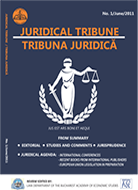Litigation to execution in legal labour relationships. Study case
Litigation to execution in legal labour relationships. Study case
Author(s): Dragoş Lucian RădulescuSubject(s): Civil Law, Law on Economics
Published by: Societatea de Stiinte Juridice si Administrative
Keywords: emoluments; execution; appeal; public function; labour relationship;
Summary/Abstract: Enforced execution is the legal way by which the Creditor under an enforceable order protects his rights by resorting to coercive force of the state. When the Debtor does not comply voluntarily, the Creditor may appeal to the Bailiff to commence the enforced execution in all manner prescribed by law. Of course, the start of compulsory execution islimited by the conditions of admissibility imperatively specified in the law, principally thecondition to exist an enforceable order owned by the Creditor. Regarding the order to beenforced, it can be represented either by an enforceable or final judgement, with provisional enforcement or any other document that can be enforced. Procedurally, theprovisions of Art. 712 of the Civil Procedure Code allow the introduction by a Creditor whohas a litigation to execution against the execution itself, against the Closures issued by the Bailiff, and against any other act of enforcement. Jurisdiction of the Court in this matter will be of the Executor Court or the Court in whose district the Debtor is situated, on thedate of the appeal. The appeal of the Debtor questions the Parties not only over the acts ofexecution because the appeal is also allowed over the explanations relative to the meaning, scope or application of the enforceable order, but in the conditions limited by the legalnature of this order. Thus, according to the law when enforceable order is not issued by a Court or Arbitration may be invoked before an Executor Court including reasons of fact orlaw which could not be discussed during an earlier trial, in the first instance or in an appeal. Basically, if enforced execution is under an enforceable order that is not from a Court, these reasons can be invoked when there is no other processual mean for its abolition. There also can be submitted a complaint against the Closure by which wasupheld the appeal for an enforced execution, and the act of execution concerning the division of the common property or common goods. For the purposes of the foregoing ideas, the article details the mean of introduction the execution appeal for recovery of emoluments arising from a legal labour relationship. Creditor’s debt is represented by the financial rights related to the management function held in a public institution. Regarding the enforcement order it is the Decision of the Appeal Court by which the Debtor public institution is obliged to cover the material damage suffered by the Creditor civil servant, starting from the time of his dismissal from the management function until effectively reintegration on the same position. There are analysed the Debtor’s appeals requesting the annulment of execution acts issued by the Bailiff, and the execution itself, the appeal motivation, the defences of the parties in fact and in law, and the role of the Court duringthe course of the procedure.
Journal: Tribuna Juridică
- Issue Year: 6/2016
- Issue No: 11
- Page Range: 47-55
- Page Count: 9
- Language: English

